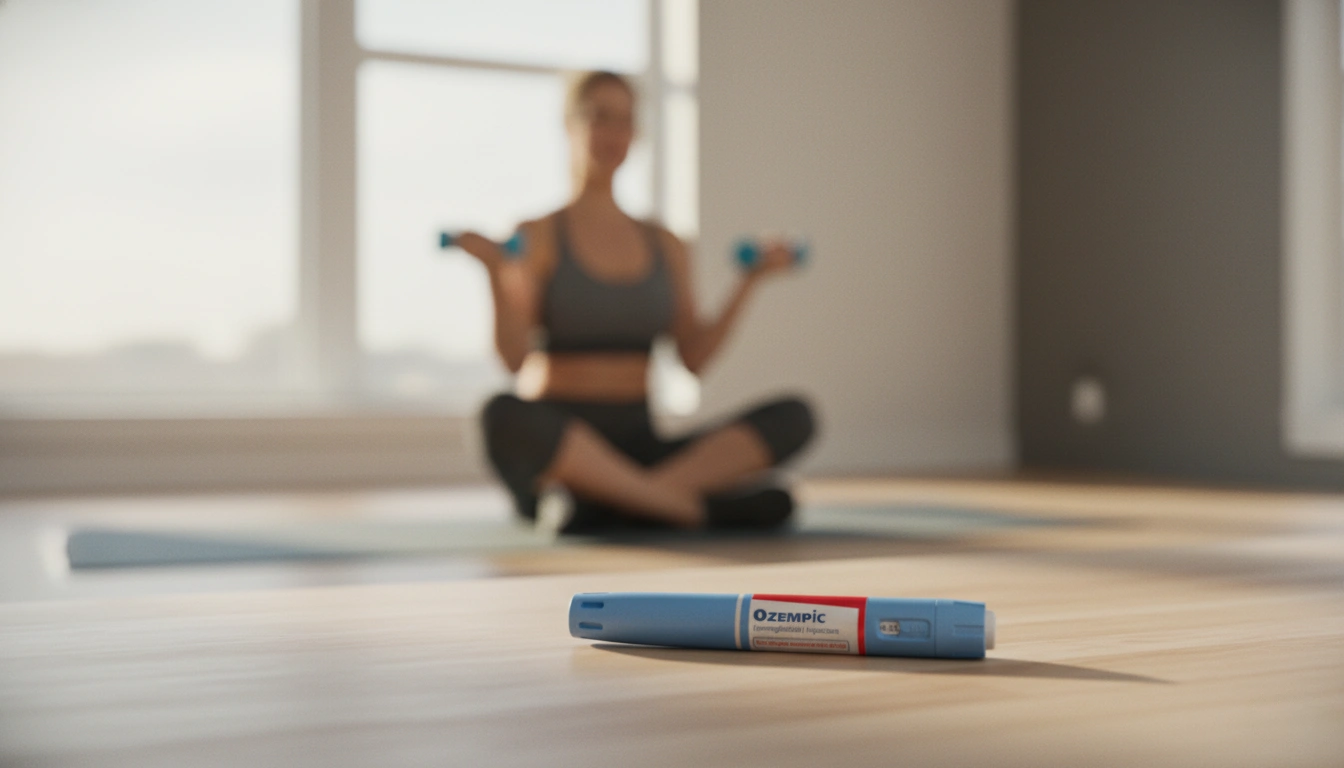How the Ozempic Pen Works: A Comprehensive Guide

Introduction
Imagine managing your blood sugar levels with a simple weekly injection that could also aid in your weight loss journey. This is the promise of the Ozempic pen, a revolutionary tool designed for individuals managing type 2 diabetes. With approximately 37 million Americans living with diabetes, understanding how to effectively use treatments like Ozempic is more relevant than ever.
The Ozempic pen, which delivers semaglutide, offers a user-friendly way to help control blood sugar levels while promoting a feeling of fullness. While it was initially developed for diabetes management, many are curious about its potential role in weight management as well. This blog post will unpack the mechanisms of the Ozempic pen, how to use it properly, and the implications of its use on weight loss—all within the context of our shared commitment at TrimRx to provide safe and effective weight loss solutions.
Throughout this article, we will guide you through the key aspects of the Ozempic pen: its function, dosage, administration techniques, and safety precautions. By the end, you will have a clearer understanding of how the Ozempic pen works and how it fits into broader health and wellness goals.
What is Ozempic?
Ozempic is a prescription medication that contains the active ingredient semaglutide, a GLP-1 (glucagon-like peptide-1) receptor agonist. This class of medications works by mimicking the effects of a naturally occurring hormone in the body that helps regulate blood sugar levels. Approved by the FDA in 2017, Ozempic is primarily used to improve blood sugar control in adults with type 2 diabetes.
Mechanism of Action
Ozempic functions by:
- Increasing insulin secretion: It enhances the pancreas's ability to release insulin, which helps lower blood sugar levels.
- Suppressing glucagon: Ozempic decreases the amount of glucagon released by the liver, which prevents the liver from producing too much sugar.
- Slowing gastric emptying: By delaying the emptying of the stomach, Ozempic promotes satiety, making you feel fuller for longer.
Together, these actions help manage blood sugar levels while also contributing to weight loss in many patients. Although Ozempic is not FDA-approved specifically for weight loss, it has been associated with weight reduction as a side effect, leading many to explore its potential benefits in this area.
Understanding the Ozempic Pen
The Ozempic pen is an injection device designed for ease of use. It comes prefilled with semaglutide and is intended for subcutaneous (under the skin) injection. Each pen is designed to deliver multiple doses, making it a convenient option for those who need regular medication.
Dosage Options
The Ozempic pen is available in three different dosage strengths:
- 0.25 mg: This is typically the starting dose, used for the first four weeks.
- 0.5 mg: This is often the maintenance dose for patients who have stabilized on the initial dose.
- 1 mg: This is for patients who may require higher doses based on their response and tolerability.
Each pen is color-coded for easy identification of the dose it delivers.
How to Use the Ozempic Pen
Using the Ozempic pen correctly is crucial for ensuring its effectiveness. Here’s a step-by-step guide to help you navigate the process seamlessly.
Step 1: Prepare the Pen
Before using the pen for the first time, ensure that:
- The pen is stored in the refrigerator until its first use.
- You check the label to confirm that it contains Ozempic.
- The solution is clear and colorless (do not use if it appears cloudy or discolored).
Step 2: Attach the Needle
- Remove a new needle from its packaging.
- Screw the needle onto the pen until it is tight.
- Remove both caps (outer and inner) from the needle.
Step 3: Check the Flow
Before your first injection with a new pen:
- Turn the dose selector to the flow check symbol.
- Press the dose button until the dose counter shows 0.
- Check that a drop of Ozempic appears at the needle tip.
If no drop appears, try again up to six times. If it still doesn’t appear, change the needle and repeat the process.
Step 4: Select Your Dose
Turn the dose selector until the desired dose appears in the dose counter. Ensure that you are selecting the correct dose as prescribed by your healthcare provider.
Step 5: Inject the Dose
- Choose an injection site: Common areas include the abdomen, thigh, or upper arm. Rotate injection sites to prevent skin issues.
- Insert the needle into the skin.
- Press and hold the dose button until the dose counter shows 0. Count slowly to six to ensure the full dose is delivered.
- Remove the needle and dispose of it in a sharps container.
Step 6: Store the Pen
After use, store the pen with the cap on. If using the pen for more than one dose, you can keep it at room temperature (between 59°F to 86°F) or return it to the refrigerator. Be sure to discard the pen after 56 days, regardless of how much medication is left.
Safety Precautions
While the Ozempic pen is generally safe for most users, it’s essential to take certain precautions:
- Do not share your pen with others, even if you change the needle. This helps prevent infections.
- Monitor for side effects: Common side effects include nausea, vomiting, diarrhea, and stomach pain. If these persist or worsen, consult your healthcare provider.
- Stay hydrated: If you experience gastrointestinal side effects, ensure you drink plenty of fluids to prevent dehydration.
The Role of Ozempic in Weight Management
The interest in Ozempic for weight management stems from its ability to promote satiety and, consequently, reduce food intake. While it is primarily approved for diabetes management, many individuals have reported weight loss as a beneficial side effect.
Clinical Evidence
Clinical trials have shown that semaglutide can facilitate significant weight loss when combined with a reduced-calorie diet and increased physical activity. For example, participants in clinical studies have lost an average of 14 to 20 pounds over 40 weeks of treatment, underscoring its potential role in helping manage weight.
Considerations for Weight Loss
While many find success with Ozempic, it’s vital to approach weight loss holistically. This includes:
- Dietary Changes: A balanced diet rich in whole foods can enhance the effectiveness of Ozempic.
- Physical Activity: Regular exercise is a crucial component of any weight loss plan.
- Consultation with Healthcare Providers: Regular check-ins with your healthcare provider ensure that your treatment plan remains effective and safe.
At TrimRx, we emphasize the importance of a comprehensive approach to weight loss that combines medication, lifestyle changes, and ongoing support. If you're considering Ozempic as part of your weight loss journey, we encourage you to take our free assessment quiz to determine your eligibility for personalized weight loss programs.
Conclusion
The Ozempic pen represents a promising tool in the management of type 2 diabetes and has garnered attention for its potential role in weight management. By mimicking natural hormones in the body, it helps regulate blood sugar levels while also promoting satiety. Proper use of the Ozempic pen is crucial for maximizing its benefits, and understanding how to administer it safely can empower you on your health journey.
As we’ve explored, the journey to effective weight management is multifaceted, requiring a blend of medication, diet, and lifestyle changes. If you’re interested in embarking on this journey, we invite you to take our free assessment quiz to explore personalized weight loss options tailored to your needs.
FAQ
Can anyone use the Ozempic pen?
Ozempic is primarily prescribed for adults with type 2 diabetes. If you are considering it for weight loss, consult your healthcare provider to determine if it is appropriate for you.
How often do I need to inject Ozempic?
Ozempic is administered once a week. Consistency is key to maintaining effective blood sugar control and weight management.
What should I do if I miss a dose?
If you miss a dose, you can take it within five days of the scheduled time. If more than five days have passed, skip the missed dose and resume your regular schedule.
Are there any side effects?
Common side effects include nausea, vomiting, and diarrhea. Most side effects tend to decrease over time. If you experience severe symptoms or persistent discomfort, contact your healthcare provider.
How does Ozempic compare to other weight loss medications?
Ozempic is primarily a diabetes medication, while Wegovy, which is also semaglutide, is specifically approved for weight management. Both have similar mechanisms of action but different dosing and indications.
In summary, understanding how the Ozempic pen works and how to use it effectively can significantly impact your health journey. With the right guidance and support, we can navigate this path together toward a healthier lifestyle.

Transforming Lives, One Step at a Time
Keep reading
Ozempic Pens: How They Come and What to Know for Your Weight Loss Journey
Wondering how do Ozempic pens come? Get a complete guide on types, dosages, and how to use, store, and dispose of your Ozempic pen safely. Learn more!
Optimal Storage for Ozempic® Pens: How Long Does an Ozempic Pen Last Once Opened?
Wondering how long does an Ozempic pen last once opened? Learn crucial storage guidelines to ensure your medication stays effective and safe. Get expert tips!
Mastering Your Ozempic Pen: A Step-by-Step Guide for Safe and Effective Use
Learn how do you use the Ozempic pen safely and effectively with our step-by-step guide. Master prep, flow check, dose selection, and injection for optimal results.



